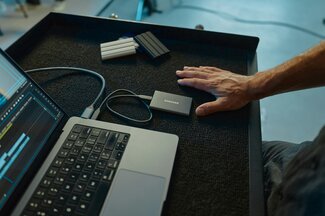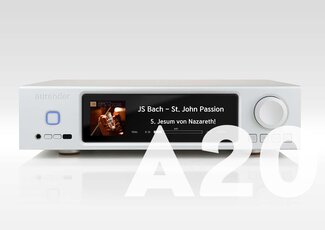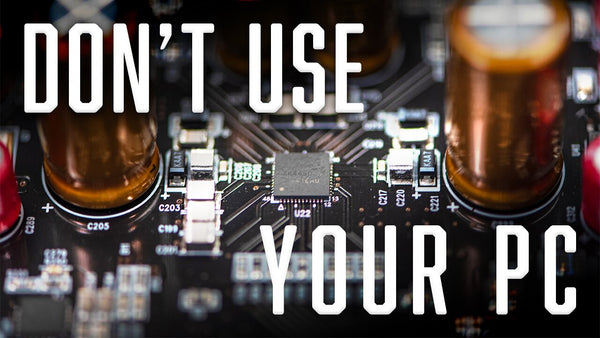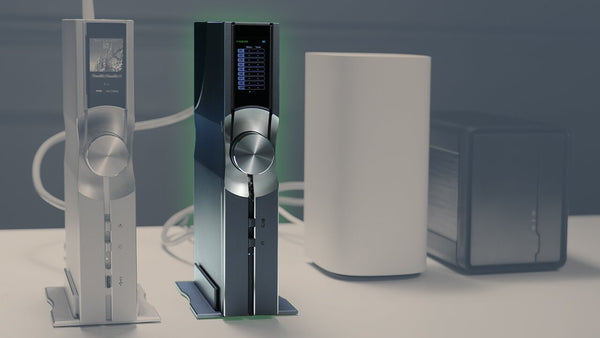Why You Need to Buy a Music Server
Read Time: Approx. 11 min.

TL;DR
- Music servers centralize your entire digital collection, storing and organizing ripped CDs, purchased digital audio files, and streaming service access in one dedicated device.
- Dedicated music servers use specialized components that eliminate electrical noise, timing errors, and processing interruptions that computers, NAS devices, and media server Linux systems create
- Options range from basic servers requiring external DACs to all-in-one units with built-in DACs and preamps, plus CD ripper models for those still building their digital libraries from physical media
- Aurender leads the market with comprehensive solutions spanning from the ACS10 (with CD Ripper) to the flagship N50, all featuring proprietary hardware/software integration and the user-friendly Conductor App
- Music servers let you preserve and enjoy your CD collection digitally while maintaining ownership of your music, unlike streaming services, where you don't truly own the content
Access and Store Your Digital Audio Files in One Place
The way we listen to, organize, and engage with music is constantly changing. With the luxury of digital audio files and music streaming services like Amazon Music, Apple Music, Tidal, and Qobuz at our fingertips, we often forget about physical media–a relic of the past.
I remember the days when I couldn't go anywhere without my handheld CD player, and now, you can't even find a single CD drive in a new car on a dealership's lot. Vinyl was cool until the first tape came out. CDs were the bees' knees until the first digital audio player hit the streets.
Digital Audio Files and music streaming services offer instant satisfaction, but when you reach the pinnacle, where do you go from there?
Many music lovers remember holding and reading album sleeves while listening to their favorite records, but much of today's youth has likely never seen a CD player, let alone a tape recorder–and they probably never will. With high-res streaming becoming the norm for many, the need for hard drive storage has lessened, and physical media has become obsolete.
Yet, we audiophiles still hold onto our beloved media collection. Why? Because it's one of the last few things we own.
You see, you don't have to go back to the Stone Age and load new DD batteries in your portable boombox to enjoy your physical media. And you don't need to jump the gun and cancel your music streaming subscriptions either–unless you want to. Owning a Music Server grants you the best of both worlds: You can still listen to the physical CDs you own and access your large digital music library with organized playlists all in one place.
What is a Music Server?
It's essential to briefly review the definitions of a music streamer and a music server, because the distinction has become blurred in high-end audio.
A Music Streamer is a device that uses a network or internet connection to access and play music from streaming services. A Music Server is a device that allows you to store your entire digital music collection and access it quickly and conveniently with a user-friendly interface.
The key difference is that music servers traditionally focus on local music file playback, while music streamers access cloud-based services. But not all components are created equally. A Music Streamer with included storage can be referred to as a streamer/server. Some manufacturers will combine both functions to provide users with a seamless way to access their ripped CD collections AND streaming services through Ethernet connectivity, and some even include Bluetooth connectivity for added convenience.
Unlike basic NAS solutions, media server setups, or software like Plex that run on general-purpose computers, dedicated music servers from brands like Aurender, Innuos, Lumin, and Bluesound (more affordable options include the Bluesound NODE) are purpose-built for sound reproduction and performance. These options often support UPnP protocols for seamless networking streaming and media player integration. For serious music lovers, the question isn't whether to invest in a music server, but rather which model serves your listening habits.
Why You Should Buy a Music Server
If you answer "yes" to any of the questions below, you'll benefit greatly from a music server.
- Do you own a collection of physical media (Vinyl, CDs, Tapes)?
- Do you currently use a computer as a server for purchased (and ripped) digital audio files?
- Do you have several hard drives with digital audio files stored on them?
Chances are, if you own physical media–CDs, tapes, or vinyl–you probably also own digital media.

Up to this point, you've probably been using your computer as a music server to house all of your music–both purchased digital audio files and ripped CD files (or other forms of physical media). While it's a good solution for storage and organization purposes, it lacks the technical precision, performance, and sound quality you get from a music server. That's not to say you can't use a computer, because you can!
For starters, computers are noisy. Unless you have a fanless and silent PC, the fans inside your computer make noise as they whirl around inside. If the computer is working overtime and it's starting to get warm, those fans will ramp up and so will the noise. And that noise will add acoustic interference that negatively impacts your audio quality. Then you have performance issues. Even the best computers will begin to lag and perform poorly if they're bogged down with stuff. The workaround? External hard drives. BUT, then there's the reality that internal storage will sound better than add-on storage–hence why you should buy a music server.
Your server accounts for 35% of the sound quality, the DAC is the rest.
Benefits of owning a Music Server
- Higher Performance, Better Audio Quality
- Centralized Music Library with Instant Access
- Massive Storage Capacity and Superior Organization
- Investment Protection and Operational Longevity
A Music Server will provide you with one place, one source of truth for all of your music to live. Unlike computers that manage multiple tasks simultaneously, dedicated music servers are built for audio. They employ specialized internal componentry that eliminates electrical noise, timing errors, and processing interruptions. With clean power delivery and reduced interference, music servers reveal micro-details and nuances in music that are otherwise masked by computer-generated noise.
Hi-fi manufacturer, Aurender, has dedicated its mission to creating high-end components that perform like a computer but deliver the sound quality only an audiophile-grade product can possess.
Buying a Music Server: Which is Right for You?
When it comes to buying a music server, there are several different routes you can take. You can opt for a dedicated music server with built-in storage and user installable storage, but it does not stream and will require connection to an external DAC, preamplifier, headphone amplifier, etc. A Music Streamer/Server or Streaming Music Server features built-in storage, user-installable storage, and streaming capabilities. These components may or may not feature internal DACs, preamplifiers, and headphone amps. The Aurender N20 does not feature an internal DAC. The Aurender A200 is a music server/streamer with a DAC and preamp.
Then there is a Music Server with a CD Ripper like the Aurender ACS10, that features built-in storage and a CD ripper, but requires connection to an external DAC, preamplifier, and headphone amplifier.
There are cases where you'll find a music server with a built-in DAC and/or preamplifier, like the Aurender A15 and Aurender A20.
Aurender is all about taking the "computer" out of the "computer audio experience," giving users access to the world of streaming music without the hassle of using a computer. It’s one of the reasons why Drew Baird, P.E., Owner and Founder of Moon Audio highly recommends Aurender, and why we are always excited to hear about their newest products. They're a one-stop-shop. All hardware and software engineering of their products is done in house, requiring no third-party software or external hardware.
And Aurender has a knack for making great audio hardware and great audio software. Developing amazing hardware alone is quite the feat and some might say it's even more difficult creating a software application with a sleek and easy-to-use user experience. Aurender is the unicorn of the HiFi audio streaming market — Creating one of the most, if not THE best, seamless user listening experiences in this regard.
Aurender has built out an incredibly comprehensive product line that features dedicated music servers, music streamers/servers, and music servers with CD rippers. Their commitment to performance is evident through their use of separate power supplies for internal components, a caching system, and a dedicated app, the Aurender Conductor app, to access it all.
Sure, there are plenty of high-end companies on the market also making music servers, but Aurender's expertise in digital source components is second to none.
Top Aurender Music Servers for High-End Audio Systems
Aurender ACS10 Music Server with CD Ripper
At $7,150, the Aurender ACS10 Music Server with CD Ripper will appeal to the audiophile with a physical CD collection. Even if you've already ripped some of the CDs in your collection, you can eliminate inserting a hard drive by ripping them directly onto the ACS10.
It's a one-stop solution for digital music management featuring a caching music server with a CD ripper, content storage, library management, and a meta-tag editor. It can be used as a companion with an existing Aurender Music Server or as a music server/streamer when connected to a USB DAC via the USB output.
Available in four different terabyte sizes, the ACS10 can be purchased in four capacity sizes (16TB, 24TB, 28TB, 36TB). The Aurender ACS10 is the perfect comprehensive solution for those looking to combine CD ripping, music storage, and high-quality playback in a single device.
Say goodbye to CD ripping on your PC and hello to the high-quality TEAC CD-ROM drive that rips all of your CDs with sophisticated error detection and correction for great-sounding results. It features Aurender's CD ripping engine that creates the best-sounding files from your favorite CDs in your choice of FLAC, WAV, or AIFF codecs, as well as support for Nimbie Autoloader for unattended ripping of up to 100 CDs.
The ACS10 is a Roon Ready and Roon Tested device that can operate as a Roon endpoint, and also supports Tidal, Qobuz Connect, and Spotify Connect.
Dragon Cable Recommendations:
Aurender A15 Music Server with DAC
At $9,250, the Aurender A15 Music Server with DAC is a great choice for those who want a server but don't have a dedicated external DAC. It's an ultra-high-performance analog output network player with a dual-mono MQA full-decoder DAC, RCA, and balanced XLR analog outputs.
The Aurender A15 features two rear panel bays which can accommodate user-installable 2.5″ HDDs or SSDs of up to 8TB each to store the largest of music libraries. The DAC chipset inside the A15 delivers a resolved, smooth sound signature that's free of digital harshness and decodes PCM upt to 32-bit/768kHz and DSD up to DSD512.
On the back panel of the A15 is a host of analog audio outputs and digital audio inputs. Analog outputs include a left/right XLR and left/right RCA, while digital audio inputs include an optical SPDIF and coaxial SPDIF RCA. The coaxial and optical digital inputs can be used to connect digital sources like a CD Transport, TV, etc. The balanced XLR and unbalanced RCA outputs guarantee compatibility with any preamp, integrated amp, and power amps.
The A15 can function as a preamplifier allowing for direct connection to a stereo power amplifier or active speaker system. The Aurender A15 is Roon Ready and supports playback from Tidal, Qobuz, Qobuz Connect, and Spotify Connect.
Dragon Cable Recommendations:
Aurender N20 Streaming Music Server
Sitting in the middle of Aurender's range of digital source components at $13,750, the Aurender N20 Streaming Music Server offers exceptional performance, combining robust server capabilities with high-quality streaming functionality. The N20 does not feature an internal DAC, so it must be connected to an external DAC for a complete high-end digital audio front-end solution
As a dedicated digital audio transport, the N20 features two internal trays for user-installable storage. Load up to two 1, 2, 4, or 8TB 2.5-inch SSDs or up to 5TB 2.5-inch HDDs for an ample amount of external storage.
The N20 is capable of upsampling any lower-resolution content up to 176.4/192kHz for better performance with some DACs. High-resolution file support for all major codecs and precision DSD-to-PCM conversion by FPGA is available for SPDIF outputs. SPDIF supports PCM formats up to 24-bit/192kHz and DSD64. In USB, PCM is supported up to sample rate 32-bit/384kHz as well as DSD256 (DoP) and DSD512 (native).
The Aurender N20 is a Roon Ready device with the ability to function as a Roon endpoint, enhancing its versatility in modern digital audio systems. The N20 supports Tidal, Spotify Connect, Qobuz, and Qobuz Connect.
Dragon Cable Recommendations:
Aurender N50 High-End Music Server
The Mac Daddy of high-end music servers, at $38,500, the Aurender N50 is the ultimate reference component for audiophiles. Aurender has outdone itself with the N50, completely separating the power supply, server, and audio blocks from each other. This triple-chassis architecture is designed to eliminate noise at its source, ensuring that nothing interferes with your music.
To further enhance its noise-free operation, Aurender implemented isolated network ports into the N50, which provide clean signal paths and heightened noise immunity to preserve the full integrity of its audio source. The N50 features an 8GB RAM, 480GB NVMe SSD system & cache storage, and two user-installable storage bays.
The Aurender N50 expands upon Aurender’s renowned digital audio interface options, offering versatile digital outputs to suit a wide range of high-end system configurations. Among the list of connectivity options are dual AES/EBU outputs with OCXO-controlled timing, which ensure professional-grade signal integrity for the most demanding DACs and digital processors. For maximum compatibility across different systems, the N50 features multiple S/PDIF outputs, including BNC coaxial, RCA coaxial, and optical/Toslink connections.
From the 8.8" wide IPS Color LCD display to the Aurender Conductor app, the N50 is an intuitive and easy-to-use component. The N50 supports TIDAL, Qobuz, and Spotify natively. It supports PCM playback up to 768kHz and DSD up to DSD1024. Additional supported formats include DSF, DFF, WAV, FLAC, AIFF, ALAC, M4A, APE, and others.
The Aurender N50 is more than just a music server–it is a statement of engineering excellence and sonic clarity. Sit back and indulge in the quiet, natural sound of the N50, characterized by a pitch-black background and vast soundstage.
Dragon Cable Recommendations:
Verdict
The evolution of audio reproduction has brought us incredible advancements and luxuries. We can access and enjoy our music virtually anywhere, no matter the time of day or situation. But with evolution comes the forgotten ways of the past, and physical media became a relic and symbol of simpler times.
High-end music servers have evolved from niche computer alternatives into essential components for serious digital audio reproduction. They've allowed us to cherish our physical media forever, reliving the memories and experiences they carried along the way.
For experienced audiophiles considering system evolution, dedicated music servers provide superior sound quality, exceptional performance, and long-term value for your entire audio system. Aurender has bridged a gap in the market where computers as servers are obsolete, and you don't have to buy a separate CD Ripper to enjoy your CDs. Components like the Aurender ACS10 provide CD listeners with a place to rip and cache their CDs, while top-of-the-line components like the Aurender N50 serve as an endgame music server in your system. Regardless of whether you have physical media that needs ripping or years of purchased digital audio files, a high-end music server can breathe new life into your system and deliver your music just the way the artist intended.
Related Videos
Introduction to Aurender Music Servers: Part I
Introduction to Aurender Music Servers: Part II
Aurender: Everything Audiophiles Should Know
























